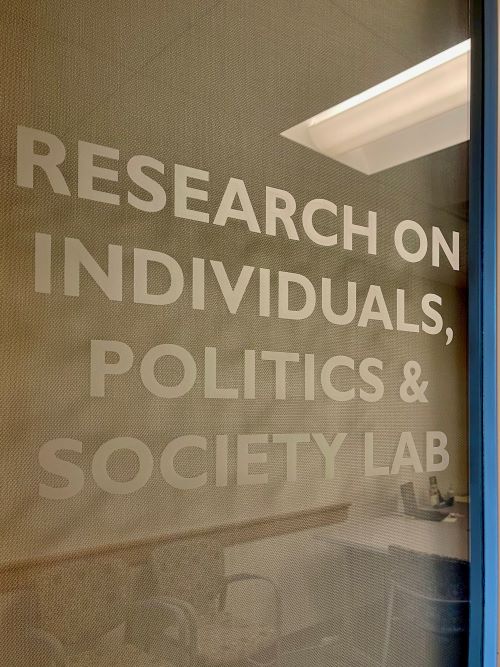Research
|
|
The Research on Individuals, Politics, & Society Lab offers faculty and graduate students the opportunity to engage in systematic studies of individual-level decision-making in politics and society. Faculty and graduate students actively collaborate in survey-based and experimental studies on public opinion, racial attitudes, voting behavior, and other topics. Graduate students have also designed and implemented their own studies using the lab's resources. The RIPS Lab group meets biweekly and provides graduate students with a forum to present and receive feedback on their ongoing work. |
Studies from the 2022-2023 Academic Year examined:
- Petition signing as a mobilizer of future political participation.
- Social networks and political consumerism.
- Emotional framing of political protests.
- Attitudes on institutional legitimacy of courts.
Studies from the 2019-2020 Academic Year examined:
- Gender differences in candidate emergence.
- Media effects on economic attitudes.
- Rhetorical effects of dehumanizing language.
Studies from the 2018-2019 Academic Year examined:
- Partisan dehumanization and affective polarization
- Partisan social norms
- Racial attitudes and views towards public transit
- Immigration attitudes
Studies from the 2017-2018 Academic Year examined:
- Media framing and the salience of racial issues
- Binary thinking and categorization speed
- Gender, language, and political judgment
- Gender representation and political engagement
- Religious beliefs and prosocial behavior
- Cognitive connections between race and partisanship
Studies from the 2016-2017 Academic Year examined:
- Within-group status and gender policies
- Gendered pronouns and discrimination
- Partisanship and cultural stereotypes
Studies from the 2015-2016 Academic Year examined:
- Partisanship and cultural stereotypes
- Corruption and voting behavior
Studies from the 2014-2015 Academic Year examined:
- The interaction between speaking style and gender in evaluations of candidates for political office
- The relationship between partisanship and racial attitudes
- The effect of partisanship on political consumption behavior
- How social norms affect media choice
- The interaction between political speech and compassion
Studies from the 2013-2014 Academic Year examined:
- The effect of disgust-provoking images on public attitudes
- Political language in the assessment of war casualties
- The relationship between personality traits and preference for incivil news
- The effect of national status on support for foreign aid
- How third party assistance affects the likelihood of conflict initiation
Studies from the 2012-2013 Academic Year examined:
- The role of issue framing on attitudes and policy related to human trafficking
- How threats to group inclusion affect public opinion
- The effect of framing on attitudes towards LGBT policies on a college campus
- How polarization affects willingness to share and consume political information via social media
- The effects of trust in one's community and the police on vigilante justice
- Differences in modes of study on key moderating effects in survey responses
Studies from the 2011-2012 Academic Year examined:
- Implicit attitudes towards obesity
- The effect of eligibility on support for conditional cash transfer programs
- The effect of group agreement and disagreement on political attitudes
- Control of reported attitudes towards immigration
- How language affects candidate evaluations and information processing
- Differences in modes of study on survey responses
Studies from the 2010-2011 Academic Year examined:
- Risk attitudes and political participation
- The effect of framing on public opinion
- Implicit attitudes towards mental illness
- Attitudes towards democracy
- The effect of the number of candidates on turnout and satisfaction with elections
- Participation decisions over time
- Social cues and political participation
- The effect of personal space on attitudes towards personal freedoms
Studies from the 2009-2010 Academic Year examined:
- The impact of terrorism on political tolerance
- Emotion and risky decision-making
- Effects of question wording on trust in government
- The effect of media violence on public support for war
- Implicit attitudes towards racial and ethnic groups
- Subliminal priming and candidate choice
- The effect of discredited information on public opinion

